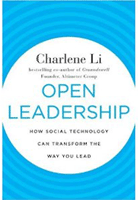I find this stuff so that you don’t have to.
- Civic Commons code-sharing initiative bids to reduce government IT costs – "Around the United States, city governments have created a multitude of software. Unfortunately, most of the time the code from those projects is not shared between municipalities, which results in duplication of effort and redundant, static software."
- Anonymity, trust and openness on the social intranet – "In some organisations, the cloak of anonymity could help to establish the first part of that trust relationship, and reassure colleagues that leaders are, in fact, really listening; once it exists, it’s easier to step out of the shadows with a greater degree of trust and openness."
- The end of history – "History will, of course, look after itself. It always has. But the future history of our time will be different from our histories of past times, and that will not be because we have an eye to the future, but because we are always relentless focused on the present."
- Why aren’t we all working for Learning Organisations? – "…the authors suggest a way for managers to switch from a ‘command and control’ to a ‘systems thinking’ mindset in order to achieve genuine organisational learning."
- Quixly – Cool way to host and deliver paid-for content, such as e-books.
- Understanding Marin County’s $30 million ERP failure – It's not just UK government that cocks up IT projects.
- Google Wave open source next steps: "Wave in a Box" – "We will expand upon the 200K lines of code we've already open sourced (detailed at waveprotocol.org) to flesh out the existing example Wave server and web client into a more complete application or "Wave in a Box.""
- Should Governments Legislate a Preference for Open Source? – "It's easy to legislate a preference for Open Source, and difficult to implement a level playing field upon which Open Source and proprietary software could compete fairly. Thus, a number of governments have enacted the preference as an easy-to-legislate way of solving the problem, but I submit not optimally. Having a preference gives proprietary software an opening to portray themselves as the "injured party", when the reality is that historically there has been a preference for proprietary software in both legislation and internal process of government purchasers, and this still exists today."
- Wiki life – "The point, in the end, is that Wikimedia by its DNA operates in public and benefits accrue — not just as product and engagement and promotion and distribution but also as strategy. That’s the next step in creating the truly public company or organization."
- First Impressions: VaultPress (WordPress Backup) – Nice summary of the premium backup service for WordPress (sadly just in beta at the moment).
- Sink or Swim – Donald Clark on the birth of Learning Pool and why the public sector needs it more than ever.
- Damien Katz: Getting Your Open Source Project to 1.0 – Great notes on successful open source development.
- Harold Jarche » The Evolving Social Organization – "For decades, organizational growth has been viewed as a positive development, but it has come at a cost."
- O’Reilly, Open Government and the Ingenuity of Enthusiasm – "It is quite clear that performance management and procurement, as well as many other government processes, need to be revised, reformed or radically changed. But this won’t happen unless we recognize that government and its employees need to remain in charge, need to stay as the custodians of neutrality and transparency, and we, the people, developers or users, can just help them do a better job but not replace them in any way."
- Research findings and recommendations for Councils – Some fantastic shared learning here from Michele.
- sigil – "Sigil is a multi-platform WYSIWYG ebook editor. It is designed to edit books in ePub format."
- Enterprise 2.0 Perceived Risks: Myth or Reality? – "…security is a personal thing, a personal trait that everyone needs to nurture and treasure accordingly."
- Using Free, Open-Source Software in Local Governments – "…how is it that local governments have failed to capitalize on the cost-saving and productivity-enhancing benefits of using open source software, especially given the budget crises they face?"
- Open Government Data – "This event will bring together movers and shakers from the world of open government data — including government representatives, policymakers, lawyers, technologists, academics, advocates, citizens, journalists and reusers."
- WordPress › Email Users « WordPress Plugins – "A plugin for wordpress which allows you to send an email to the registered blog users."
You can find all my bookmarks on Delicious. There is also even more stuff on my shared Google Reader page.
You can also see all the videos I think are worth watching at my video scrapbook.

 I had an enjoyable couple of hours yesterday evening at the LSE, attending
I had an enjoyable couple of hours yesterday evening at the LSE, attending  Am reading an excellent book at the moment –
Am reading an excellent book at the moment –